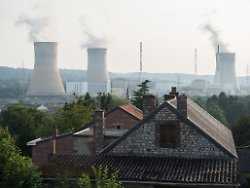Term extended to 2035
NRW is worried about Belgian nuclear safety
03/19/2022, 5:35 p.m
Because of the Ukraine war, Belgium is allowing two nuclear reactors close to the German border to run longer. The government in Düsseldorf reports security concerns and demands tough tests. However, Aachen had previously failed with similar lawsuits.
Following Belgium’s announcement that it would postpone the phase-out of nuclear power by ten years, North Rhine-Westphalia expressed safety concerns and called for the plants to be inspected intensively. The North Rhine-Westphalia Ministry for Economic Affairs and Energy announced that it was a sovereign decision of each state as to how it wanted to meet its electricity requirements. “In the interest of the citizens of the EU, however, the security requirements and thus also the interests of the European neighbors must of course be taken into account.”
The Belgian Prime Minister Alexander De Croo had previously announced the planned lifetime extension of the nuclear reactors. The Tihange 3 nuclear power plant, which is only about 60 kilometers from Aachen, and the Doel 4 nuclear power plant near Antwerp should be able to continue operating at least until the end of 2035. “In order to regain lost trust in the safety of the plants, which will then be 50 years old, we will push for transparency in the decision, a comprehensive cross-border environmental impact assessment and strict standards for the comprehensive safety check,” said the NRW Ministry.
Lawsuits in Brussels failed
North Rhine-Westphalia has long criticized the failure-prone reactors in neighboring Belgium. The city of Aachen and the federal government have therefore repeatedly called for the reactors to be shut down in the past. The oldest are from the 1970s. The Aachen city region and its partners in Luxembourg and the Netherlands had recently failed with lawsuits in Brussels. However, it was about the Tihange 2 reactor. Due to small cracks in the concrete protection of the reactor, the safety of the reactor is disputed.
By postponing the nuclear phase-out, Belgium wants to ensure its energy security, also in view of the war in Ukraine and the recent sharp rise in energy prices. The planned extension of the service life still has to be negotiated with the operator Engie. He had actually prepared to shut down the power plants by the end of 2025 at the latest.
